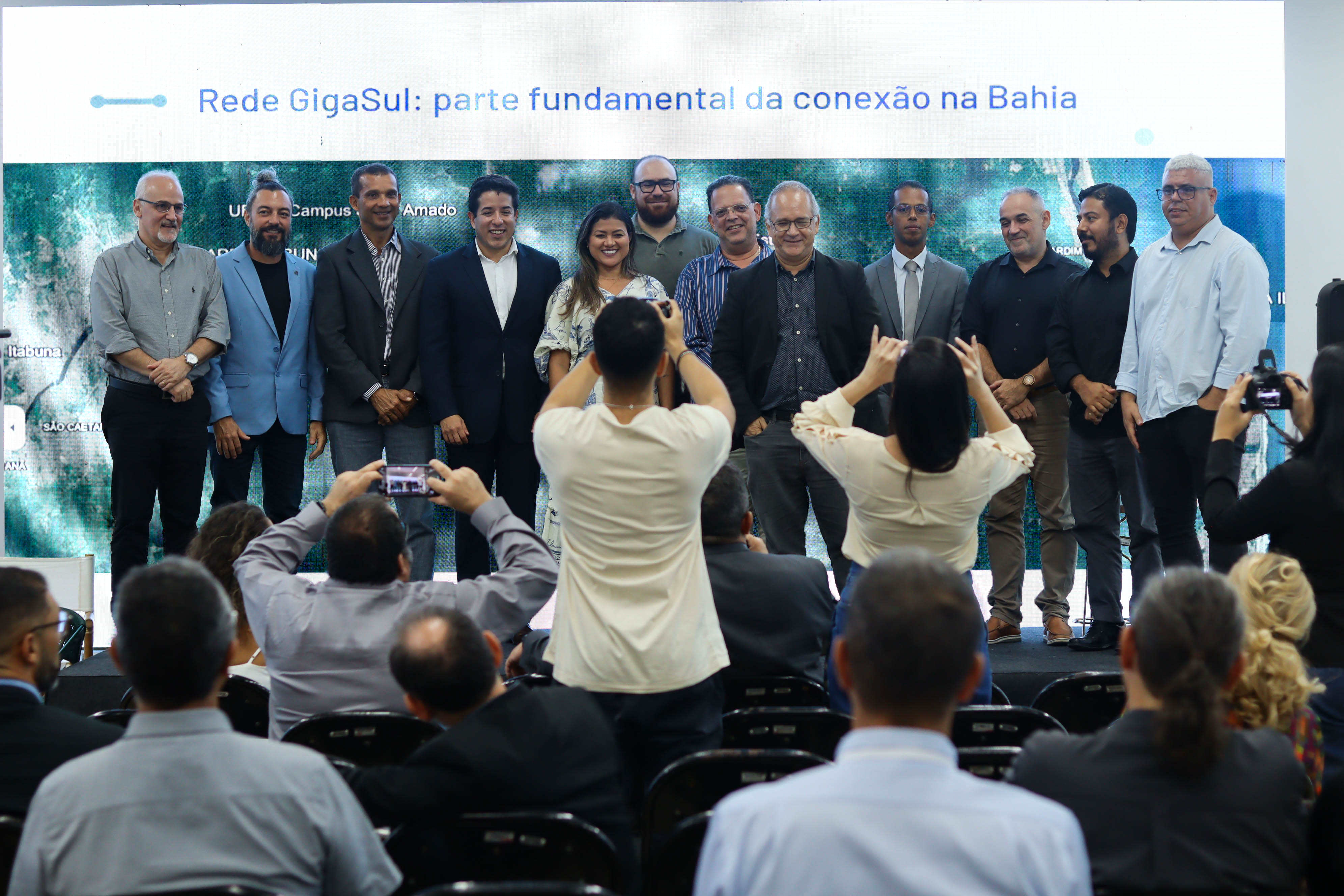First section of the GigaSul Network is launched in Ilhéus
During the Ilhéus Innovation Week, held this Thursday (23), the first section of the GigaSul Network was inaugurated. This event marks an important step towards the expansion of metropolitan optical fiber networks in the southern region of Bahia, initially connecting Ilhéus and in the future Itabuna and Uruçuca.
The GigaSul Network is an integral part of Infovia Bahia and aims to provide a more efficient internet connection, improving communication between universities, Science and Technology Institutes (STIs) and city governments. This will result in improved public services in the areas of health, education and security.
The inauguration was attended by representatives from the city governments of Ilhéus and Itabuna, the National Education and Research Network (RNP), the State University of Santa Cruz (UESC), the Federal University of Southern Bahia (UFSB), the Federal Institute of Bahia (IFBA), among others. The presence of these institutions highlights the importance of the project for the academic and scientific community in the south of the state.
“This is an important milestone for our innovation week and, at the same time, it is the beginning of a public policy that aims not only to generate internet delivery for institutions, but also to share important information and data to generate improved technological solutions, providing connectivity and new solutions for our society”, says Lucas Mota, innovation manager for the city of Ilhéus.
The initial connection of the Network is 10 Gb/s and will be made available to the campuses of UFSB, IFBA and UESC in Ilhéus. In the future, it will be expanded to the municipalities of Itabuna and Uruçuca, benefiting the entire user community of these institutions in the region.
“Our way of offering undergraduate education, especially here in the southern region of Bahia, depends heavily on a secure, reliable and robust network infrastructure. This was our major concern until we learned about the GigaSul Network proposal, which was a great fit for the model we were considering for the university, which also takes education to the surrounding municipalities where we have our campuses,” highlights Francesco Lanciotti, pro-rector of academic management at UFSB.
In addition to directly benefiting educational and research institutions, the GigaSul Network will be able to serve other organizations, such as CEPLAC, SENAI and the Costa do Cacau Regional Hospital (HRCC). This expanded connectivity aims to foster technological development and improve the quality of services provided to the population.
The GigaSul Network is part of the Veredas Novas Estaduais (VNE) Program, which was created in partnership with the National Council of State Secretaries for Science, Technology and Innovation Affairs (CONSECTI). The program has the support of the Secretariat of Science, Technology and Innovation (Secti), through a Technical Cooperation Agreement with RNP and Coelba, which made the project possible.
“The GigaSul Network is an important arm for scientific and technological development in the state of Bahia, where there is a cluster of institutions that discuss education, science and technology. In addition, the network is configured as an arm of Infovia Bahia, which is a project of the Conecta Program, which will provide the state with greater capillarity of connectivity, services and RNP’s activities”, points out the RNP’s Federative Relations Manager, Rafael Pontes.
About Infovia Bahia
Infovia Bahia is being implemented in 20 cities in the state, connecting around 41 campuses of educational and research institutions. With approximately 2,500 kilometers of fiber optics, the initiative aims to reduce high-speed connection costs and support public policies in the areas of education and health, including telemedicine.
The information highway project is part of the Conecta Program, which aims to expand the scope, quality and security of connectivity for education and research in the country. In addition to the information highways in the states, the capacity of the national research network, the Ipê network, will be expanded, National Data Centers (CND) will be implemented and a very high-performance and secure service will be established in the e-Ciência Network.
The program will provide significant progress in the interiorization of the states, through 18 information highways and 79 metropolitan networks in the interior, in addition to those already existing. On this infrastructure, the new national cybersecurity model for the RNP System is also being developed.
With resources from the National Fund for Scientific and Technological Development (FNDCT), of the Ministry of Science, Technology and Innovation (MCTI), the initiative is part of the new Growth Acceleration Program (PAC) of the federal government. The implementation is the responsibility of RNP.
